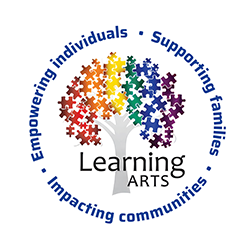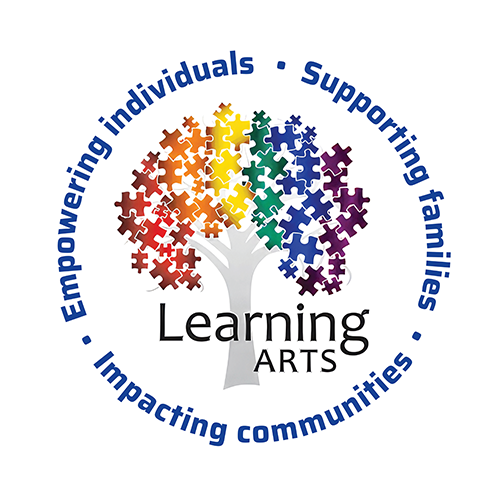
The Emotional Landscape of Parenting a Child with Autism

June 27, 2024
Navigating the Journey of Parenting a Child with Autism
Parenting a child with autism is a unique and multifaceted experience, filled with both challenges and profound rewards. Parents often describe a mix of emotions—from the uncertainty and worry of initial signs and diagnosis to the determination and hope that come with seeking the best care and support for their child. It’s a journey that requires resilience, patience, and a deep well of love. At Learning ARTS, we understand the emotional toll this can take on families and offer resources to help parents navigate their feelings and build a strong support system.
The Rollercoaster of Emotions for Parents of a Child with Autism
 When parents first notice early signs of autism in their child, the initial reaction is often one of confusion and concern. Questions flood their minds: “What does this mean for my child’s future?” “Will they be able to live a fulfilling life?” This period of uncertainty can be incredibly stressful, as parents grapple with the unknown and begin the process of seeking a diagnosis. The diagnostic process itself can be a source of anxiety, as parents undergo evaluations and assessments to understand their child’s needs.
When parents first notice early signs of autism in their child, the initial reaction is often one of confusion and concern. Questions flood their minds: “What does this mean for my child’s future?” “Will they be able to live a fulfilling life?” This period of uncertainty can be incredibly stressful, as parents grapple with the unknown and begin the process of seeking a diagnosis. The diagnostic process itself can be a source of anxiety, as parents undergo evaluations and assessments to understand their child’s needs.
Once a diagnosis of Autism Spectrum Disorder (ASD) is confirmed, emotions can range from relief at having an explanation for their child’s behaviors to fear and sadness about what the future might hold. It’s common for parents to feel overwhelmed by the multitude of decisions they need to make regarding their child’s care and education.
Finding Determination and Hope when Parenting a Child with ASD
Despite the initial challenges, many parents find a renewed sense of determination and hope as they begin to seek out the best care and support for their child. This phase involves researching various educational programs, interventions, and therapies (including ABA therapy) that can help their child develop essential skills and reach their full potential.
Parents often become advocates for their children, working tirelessly to ensure they receive the appropriate services and support. This advocacy can extend to schools, healthcare providers, and community resources. The journey of advocating for a child with autism can be empowering, as parents see the positive impact of their efforts on their child’s progress.
Building Resilience and Patience
The journey of parenting a child with autism requires immense resilience and patience. Daily routines may need to be adjusted, and parents often learn to navigate sensory sensitivities, communication challenges, and behavioral issues. Developing coping strategies and seeking support from professionals and other parents can help build resilience.
Patience is key, as progress can be slow and incremental. Celebrating small milestones and recognizing the unique strengths and abilities of each child can help maintain a positive outlook. It’s important for parents to practice self-care and seek emotional support to sustain their resilience over the long term.
 The Importance of a Strong Support System
The Importance of a Strong Support System
Having a strong support system is crucial for parents of children with autism. This support can come from family, friends, support groups, and professional resources. Sharing experiences with other parents who understand the challenges and rewards of raising a child with autism can provide comfort and valuable insights.
Conclusion
Parenting a child with autism is a journey filled with unique challenges and remarkable rewards. By understanding the emotional landscape of this journey, we can foster a more compassionate and supportive community for parents and their children. At Learning ARTS, we are committed to providing the resources and support families need to navigate this path with resilience, patience, and hope.
For further reading and resources, please visit:
- Autism Foundation -Family Support for Autism
- Child Mind Institute – Family Resource Center
By working together, we can build a more inclusive and supportive world for individuals within the autism spectrum and their families. For more information, contact us at referrals@learningarts.com.

About Author: Learning Arts
Formed by Dr. Will Brandon in 1997, Learning ARTS has been on a mission to be a leading force in autism therapy, pushing the boundaries of what’s possible and creating a brighter future for individuals within the autism spectrum, their families, and communities for nearly 30 years.
It is that experience that helps us understand that finding the right treatment for an individual within the autism spectrum can be overwhelming and confusing. But rest assured, when you choose Learning ARTS, you’re choosing a partner for your family’s autism journey. We offer a personalized, family-oriented approach to care that focuses on building relationships and social skills while providing access to community and classroom functions. Together, with our team by your side, your family will thrive.



